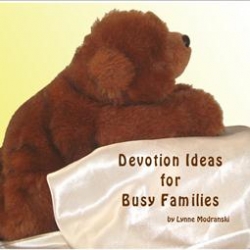Devotion Ideas for Busy Families

What are Family Devotions?
Are you ready to give your kids a jump start toward a life lived for Christ? Daily devotions can be a great way to help them on the right path.
So now, before you read some of my devotion ideas, let's explore "devotions." In adult terms, a "daily devotion" is usually a time of reading scripture and perhaps a short poem or meditation by an inspirational writer in order to focus one's thinking on becoming more "devoted" to Christ. A devotion time usually includes prayer. Some may even do some journaling, listen to Christian music or use the time to read a non-fiction book by a Christian author. The main goal of this time (generally 20-60 minutes) is to set apart some time in the day to focus on and get to know the Creator better.
My daughters are all grown up now. In fact, two have children of their own As I watch them living their own lives, I'm convinced that the greatest gift I gave them was to help them meet Jesus Christ and develop a personal relationship with Him. As my girls grew, I was also growing (and still am). I didn't always use all the ideas you're about to read. Some I've incorporated into my own life since they left home. Others I wish I'd thought of earlier, but I hope they now can help someone else.
It is my goal to share ideas that can help families draw closer to Jesus Christ through simple everyday tasks. In the following pages you'll find those thoughts. However, don't let them limit you, let them be a springboard to your own creative times with Jesus. And if you discover something that touches you, let me know! What moves you closer to your Heavenly Father will almost undoubtedly move someone else, too. Share your revelation, and I'll pass it along.
May God bless your attempts to know Him more! Keep Lookin' Up!
Lynne

Why Should I do Devotions with my Family?
One of the first things I asked the small group was "Why do you want to do family devotions?" What is it that you hope to accomplish with these activities? It's important to have a goal as you begin to lead your family spiritually and know WHY you're going to do this. Everyone may have different reasons to begin a family devotion time, but I'm guessing your primary goal will be to help your child (as well as the adults in your house) have a deeper, more personal relationship with Christ.
Throughout history theologians, pastors, church leaders and even grandmothers have proven that there are certain spiritual disciplines that help us develop a real and life-changing relationship with our Heavenly Father. One theologian (Richard Foster) lists the disciplines as meditation, prayer, fasting and study, simplicity, solitude, submission and service, confession, worship, guidance & celebration. Some of these disciplines are more difficult to cultivate (especially in wee ones) and some are easier. Some adapt more readily to your personality, others may not. My goal is to help you find some ideas that you might be able to adapt to your family to help them develop spiritual disciplines. And as you read, don't forget, it's OK to be creative and take these, and any other, ideas and mold them to fit your family's personality.

When is the best time to do Family Devotions?
When adults ask me that question about their personal devotions, I will generally recommend they try to start their day with a quiet time with God. A lot of times if we wait until later, it just won't happen. Plus, there's something about giving Christ the "firstfruits" of your day that makes the rest of the day go better.
With family devotions, I suggest a somewhat broader and more flexible approach. If you like structure, you might want to set aside a special time. But some families' calendars just don't permit that kind of discipline. Fortunately family devotions can happen at various times throughout the day and preferably at every moment during the day. In fact, I recommend setting a goal to make every moment a devotional moment. Let me warn you that the devotions you find here are geared primarily toward a family with children, but if you don’t have kids, don’t be discouraged. Jesus still visits people who don’t have children.
Some of the ideas below you may be able to "schedule" and have a set time for. For example:
Car Devotions: In the midst of our busy life sometimes you might have to do devotions in a car. Take the ideas you're about to encounter and adapt them to fit your ride time. C'mon, you can do it! Pray, Sing, Talk about Scripture. As your children learn to read give them a verse to read in the car each day and then talk about it. You might be surprised how much scripture YOU can memorize by helping them.
Table Devotions: Use dinner or breakfast time as a devotion time. Before dinner, after breakfast, whatever you choose. If there's a time that the entire family already gathers you already have the makings for a great devotion time.
Bedtime or Morning Devotions: If your family schedule allows, you may want to set aside 15 or 20 minutes before the family leaves for the day or right before you tuck the kids into bed. If you already do a bedtime story, it would be easy to make this into a family devotion time.
There are other recommendations you'll find a bit more serendipitous. These are designed for when the moment presents itself so that you can turn almost every moment into a devotional moment. One of the keys in raising children who learn to love and worship Christ (and helping them become adults who do the same) is turning every day activities into God moments. Hopefully, you'll find ideas to help you make everyday adventures cause you to reflect on your Creator and Savor.
Bible Study as a Family Devotion
The Most Common form of Devotion
Most Christian moms may already practice this discipline and not even know it. By simply reading the Bible on a children's level to them, you teach them to study. Stop when you get to a word they may not understand and ask them what it means. If they don't know help them find out. Look the word up if you have to. It's great for them to see you put into practice good study habits like researching words. After you're done, ask them questions, not only about what happened in the story, but about what they would do in a similar situation or about how they would feel if something like that happened to them or how they saw God work in the story.
The material that your children bring home from church can be an excellent tool for study between Sundays. If they don't have "take home" papers, ask your child's Sunday School Teacher or Children's Church leader to let you know what their lesson was based on. Then every day talk about the story, talk about the main point that the teacher emphasized. Find out if there was a memory verse and repeat the verse several times during the day. Car rides are excellent times to learn verses or talk about these lessons.
Finally, take walks with your child and find things that God has created (yep, everything). Look at each creation with wonder and excitement and study the intricacies of some of God's creation. If you're child finds something that is "man" made, help them to understand that God gives people ideas to use the things that He created to make new things. Help your child to learn how to praise God for His creation. You could even collect things as you walk and make a creation collage to reinforce your "study time".
There are an endless amount of ways to help your child learn how to pray and study God's word. According to Foster, the disciplines of meditation and fasting go along with these first two; however, in very young children they may be more difficult to teach, but as your child gets older, help them to sit quiet and think about a Bible verse or just take in God's creation without saying a word. It's not impossible for kids to understand meditation. And as always, whether you are catholic or protestant, lent is an excellent time to begin to teach them about the basics of fasting and sacrificing something meaningful in order to grow closer to Christ.
It's impossible to do devotions "the wrong way." So, be creative. Inject your personality and teach your children to "Love the Lord their God with all their Heart, with all their Soul, with all their Mind and with all their Strength."
Available on Amazon


Simplicity in your Devotion
Is that Really a Devotional Method?
In this day and age, SIMPLICITY might be one of the most difficult on Foster's list of Spiritual Disciplines. More difficult for adults than for the children I think! Helping your child learn they need much less than they think, will not only be good for them as they grow in Christ, it could be a tremendous lesson for the adults in their life.
Here are some ideas to get you started in adding "simplicity" to your devotions:
1. A few times a year explain to your child the great blessings that God has given them. Write James 1:17 on a piece of paper and hang it on your refrigerator:
Every good and perfect gift is from above,
coming down from the Father of the heavenly lights,
who does not change like shifting shadows
Help them understand that every good gift comes from God even though someone else gives it to them. Birthdays are a tremendous time to implement this devotion. The entire day can be a time of rejoicing that God gave your child life. With each gift you can emphasize that the gifts are part of the celebration and are as much from God as they are from the gift give.
2. Likewise, God uses us sometimes to give good gifts to others. There are some children that don't have all the blessings we have. Allow your children to go through their toys and clothes with you and encourage them to "downsize." Help them choose the things that they don't really need and maybe even a few things they really like a lot. Find someplace to donate them to so they can learn at a young age to give.
3. Use occasions when your child wants something to teach the discipline of simplicity (this might be easier with older children). Help him evaluate whether he really needs it. Ask her how she can glorify God with what she wants. Encourage your child to wait at least 15 days before he gets the item (whether she is spending her money or yours). Each time during those 15 days when he talks about the item encourage him to include it in his prayers and remind him to ask God to help him always love Christ and his family more than any toys. Hopefully, by the end of the 15 days they'll discover a lot of the items they thought they wanted weren't as wonderful as they originally believed.
4. Teaching your children to tithe from a young age will not only make it easier for them to give when they are adults, but it can help them develop the discipline of simplicity. As they begin to do math, use a devotion time to help them understand what a tithe is. If they have a dime, trade it for 10 pennies and help them count 9 pennies for themselves and put 1 penny in a "Jesus jar". You can use scripture from the Old Testament (Leviticus 27:30-32) or the story of the widow's coins (Mark 12:41-44). Be careful using this devotion until you are ready to tithe your income, however. You're child is likely to ask you if you give God 10%.
Simplicity is difficult for us to learn, but implementing these kind of devotion practices can be a good way for even parents to begin to appreciate the simple things that God gives us.

Prayer in Devotion Time
Even the smallest child can do it
The first set of "disciplines" that Foster recommends are individual disciplines. These are the things that help us develop our personal relationship with Jesus Christ and are some of the most important for your child to learn at a young age.
Teach your children to have a I Thessalonians 5:17 prayer life
"Pray continually."
Have a "Prayer Tent" - Create a table tent with your kids by folding a 8.5" x 5.5" piece of paper in half (heavier paper - cardstock or construction paper - works best). Then, make a list of things and/or people that you and your family would like to pray for. Now, decide with your children if they'd like to make new Prayer Tents each week, or just make a permanent one that you can change the list each week. If they decide to create new tents each week, choose three of your prayer requests and write the same three on each side of the tent. Next, help your child(ren) decorate it while you explain how you're going to use it each day (keep reading, I'll tell you that info in a moment). If you decide to make one permanent tent, just give the child(ren) your prayer tent and allow them to decorate it. They can be as elaborate as stickers, 3-D foam or pictures of your prayer request or as simple as crayon and markers. For the permanent tent, you'll need to write the prayer requests on smaller pieces of paper (3.5x2) and tape one on each side.
Now, place the prayer tent on your kitchen table and during at least one meal a day include these requests in your prayers. Allow your children to say the prayer.
My girls were put "in charge" of the evening dinner blessing when they were very young. They started with "God is great, God is good," but it wasn't long until they began saying spontaneous prayers (not lengthy, articulate prayers, just spontaneous). When my children were pre-teens we used a simple prayer tent. I wrote down the names of all the families in our congregation and divided them by 52. Each week we wrote three families’ names on our prayer tent (the same names on both sides) and the girls including these names in their spontaneous prayers.
You might also include the kids' school list or their sports team, even their rival teams before the games each week so they can learn to pray for their friends as well as their enemies.
Serendipitous Prayer
You can teach your children to pray anytime/anywhere
These first two I call Drive by prayer
- When you see an accident, someone pulled over or a car sitting by the road. Talk about why that person might need prayer (they're hurt, they're getting a ticket and it's going to make them late or cost them money, the car broke down and they might have had to walk a long way) and then pray about that situation.
- When you drive by a house of a friend or a relative, tell your child who lives there, share the prayer needs of that family if you know them, and then pray for that family with your child. Remember to let your child say part of the prayer.
- Card Prayers - Around birthday times, Christmas and other holidays, take each card that came that day into your devotion time and pray for the one who sent it.
- Ornament Prayers - I personally pray as I decorate my Christmas Tree. I know who gave me each ornament and I say a prayer for each person as I put them on and then as I take them off. This could be an easy way to turn tree decorating into a "God Moment."
Teaching your child to pray and be honest with God might be the greatest gift you ever give him. It could be the most wonderful thing you teach yourself!
To Kindle or Not to Kindle
I'm working to get this on Kindle. It has to be completely reformated, so it's taking me some time.
If you'd like to see it on Kindle, be sure to leave your e-mail address in the comments and I'll notify you when it's available!
Would you like to see this book on a Kindle?

Confession
What a scary topic!
For some reason no one like to even think about confessing. We prefer to keep our sins to ourselves and occasionally share them with God. But confession is an important spiritual discipline, and it's one that is much easier learned when young.
There is no better time to teach your child about Jesus than when they have done something wrong and need to confess. Each time you find yourself beginning the conversation with "What have you done?" or "Who did this?" try to think of it as a God moment (I know it's hard to believe). As you discipline your child, help them understand that when they misbehave they also sin against God. You can use the 5th commandment or "love your neighbor as yourself" to help them understand how God views their misbehavior. It's important that they discover their need to not only tell you, their friend or sibling they are sorry, but to also tell God. Take these moments to lead them in a prayer of confession. If you over-reacted to their "sin," this could be a great opportunity for you to demonstrate confession.
As your child grows and matures and begins to understand Jesus' death on the cross, you can use these moments to explain how our sin is the reason that Jesus had to die. Use this time to teach them the difference between "I'm sorry" and repentance. "I'm sorry" are important words when we are mending relationships, but repentance is more. To repent is to say I'm sorry and add to it the promise that you'll never do it again. Help your child understand that when we repent and accept Jesus sacrifice as payment for our wrongs, our sin is removed. Read Psalm 103 explaining what it means to have our sins removed as far from us as the east is from the west.
LIke tithing, this can be an uncomfortable devotional concept for the parent who isn't practicing confession. If you begin to teach your children to confess to you, to God and to others, be prepared for them to expect the same from you. But you'll discover it's a refreshing and cleansing discipline. Well worth the embarrassment and discomfort!
The Print/E-Book version
So you can take it with you
This link will take you to my store where you can purchase the print version for $10 and e-book for $3.
Since I'm not using any major publishing house, I could use some help. I'm will give a free e-book to everyone who will post this link on their blog, website, twitter page, facebook profile or other social networking forum. Just e-mail me, tell me where you posted the link and I'll send you the e-book.
Here's the short link (do not add the www.): http://tinyurl.com/famdevo
I'm thinking about making this a Kindle book - feel free to share your thoughts below!

Worship & Celebration
The FUN disciplines!
Worship and celebration are definitely the two "fun" spiritual disciplines. So, obviously, they have the potential to become two of your children's favorite devotion activities. Over the years the worldwide church has really but worship in a "box." When most people think of worship, they imagine the service we have on Sunday mornings or evenings. And while we do call those events "worship" services, to think that couple of hours each week are all there is to worship is so limiting. If we are truly followers of Jesus Christ, every moment of our lives should include some form of worship and celebration. The means by which we worship and teach our children to worship are limited only by our imaginations.
Here are a few suggestions, but I encourage you to be creative and mold these ideas to fit your personality. Remember that worship is just a fancy word for glorifying God. It's not a liturgy or ritual, it's what we do to express the love we have in our heart for our Creator and Savior. These devotion ideas will be some that you'll want to incorporate into your lives as often as possible.
- Worship & Celebrate With Music - There are a lot of great kid's worship CD's out there right now. Have you ever heard of "Go Fish?" They specialize in Kid's Worship Music. During your devotional time, pick a song that will go with whatever "theme" you're using. Help your child learn the words and what the words mean. Don't worry whether you can sing or not, just concentrate on praising the Lord. If you're not using a theme or other element of devotion, just use the songs to focus on Christ.
- With Dance and Body Language - Add movement to your devotion time. If you're using music, clap to the beat, do motions that emphasize the words, raise your hands during the slower songs and help your child understand that you lift hands to give glory to God, to reach out to him. Some do it to "hug" God. My children loved learning basic sign language to add to our songs. One of the wonderful things about ASL (American Sign Language) is that the signs really emphasize the meaning behind the words. For example, check out the sign for Jesus. Without music, you can easily take many of the Psalms and act them out. Try using Psalm 150. Pretend to play a trumpet and tamborine when you say those words.
God is worthy of our worship merely because He is the Great I Am
- With Prayer - Teach your child to praise when they pray. At a young age we usually teach them to "ask" God for things. Instead, spend a time in prayer just praising and thanking God. Everyone in the family is required to participate and no one is allowed to ask a thing. Younger children will probably only be able to thank God for "things" and perhaps people; however, I recommend that adults include praising God for who He is rather than what He does to help young children to begin to realize that God is worthy of our worship merely because He is the Great I Am even if He never did a thing for us.- With Gifts - As you teach your child simplicity through tithing, you can also teach them to worship. Use the tithe time mentioned above to help children save their money and then help them see that giving gifts to God shows our appreciation for Him and is an act of obedience, trust and worship.
- With Art - Just like your kids love to draw you pictures out of love, you can help them draw pictures for Jesus with the same motivation. Consider using a scripture verse or story (creation, flood or a Psalm) for inspiration and then just draw pictures of all the things that causes you to give God praise. If your children become good artists, you may want to research artists who draw to Christian Music. Those I've seen are truly moving and could motivate your young artist to use their gift to worship even more.
- With Acts of Service - You can easily help your child learn that action is worship. Pick a time to go out and clean trash out of the church parking lot or even along the roads. Explain to your children that this is God's creation and keeping it clean is an act of worship. You may consider taking older children to visit a nursing home with flowers or serve in a soup kitchen. Taking care of the less fortunate is an act of worship when we do it out of love for our Savior.
- With your whole being - Let your kids use their imagination. Nothing is off limits as long as it glorifies God. Our heavenly Father just asks that we love Him with all our heart, soul & mind.
A book to help you learn the disipline of confession - The Five Languages of Apology
My daughter gave me this book about a year ago. It was a wonderful lesson on learning to apologize in such a way so others will be able to accept it!
Richard Foster - Celebration of Discipline
Thanks to - These Folks for Linking to the E-Book
You'll also find other faith forming helps at these links
- Forming Faith Blog
Greg Priebbenow A Lutheran pastor shares his thoughts and reflections on the joys and challenges of forming faith in children, youth and families
Final Thoughts
The Conclusion
In the very beginning I mentioned that true devotion should become a way of life. From the time you wake your child until you tuck him back into bed, teaching your child to constantly focus on Christ will be the greatest gift you can give him. I'll be honest, I didn't use every idea I've written here. I didn't really learn the importance of this kind of devotion until my children were older. But you'll discover that focusing on Christ with your children will not only help them grow in Christ, it will spur on your own Christian walk.
Remember that the real key is to make every moment a devotional moment. It's not easy, but the more you do that in your own life and the life of your family, the closer you'll all get to Christ and the better your walk will become. Just teach your children to focus on God in all that they do so that as they grow and when they become adults, they'll do devotions on their own . . Maybe without even knowing it.
APPENDIX
Devotion Samples for Your Busy Family
Let's say it's a snowy afternoon. School has been cancelled and your kids have watched way too much TV and played Nintendo until the noises are driving you crazy. This is a great time to do a spontaneous "devotion" time.
Call all the kids together around the dinner table. Grab some blank paper (for the price, I highly recommend you keep a ream of cheap copy paper around the house at all times) and crayons or colored pencils as well as your Bible. If your children can read ask one of them to bring their Bible instead.
Read one or more of these selections
- Isaiah 45: 5-8, 12 & 18
- John 1:1-3 & Genesis 1
- James 1:17
Talk for a few moments about everything that God created. Ask your children what their favorite "creation" is. Encourage them to consider "original" works. If they say TV, video games, your house, etc.- explain "yes, that is a great thing, but that's something that humans make out of other things that God made." Help them to see that everything they enjoy is because of God's original creation. John says that "without Him nothing was made that has been was made."
After a few minutes of discussion, allow each child to draw a picture of their favorite creation. If they'd like to draw their TV or video game, have them draw something that God created that helped make their game (lightning for electricity, or rocks to represent the metal that goes into the components. This could become a bit of a science less too!)
As they draw, talk about their drawings. Remind them that God made trees so we can have paper and pencils. We have crayons because God showed someone how to separate oil into different things and create paraffin wax. Feel free to get your computer out during this part of the devotion and find out what things are made of. Get to the bottom of it! Everything that is made was brought into being because God created it's original component.
When the pictures are all done, hang them on the frig or prepare to give them to Grandma (with an explanation so the devotion can be continued) and then pray. If you have trouble coming up with your own out loud prayers, try something like this:
Father God, Thank you for all of your wonderful creation. Thank you that you made (insert some of the things you talked about God creating). You've given us a beautiful world with marvelous things to play with and protect us. Help us to never forget that it all comes from you.
In Jesus name,
Amen
You can download this Spontaneous Moment Here: Creation Devotion
Stop Back for more easy, spontaneous God Moments










